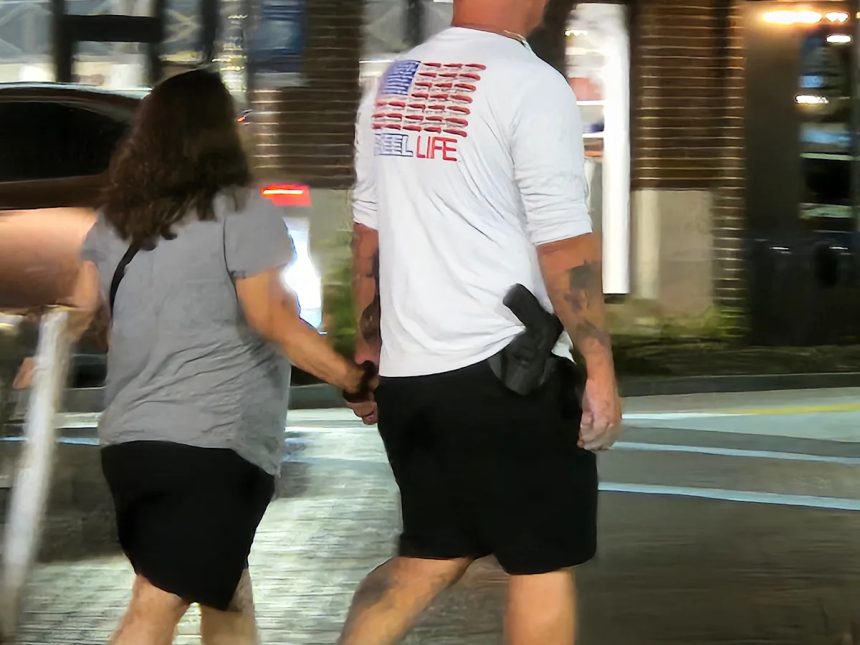Florida law is clear: People convicted of a felony are prohibited from owning or possessing firearms or ammunition. But what about other weapons — like knives, tasers or pepper spray?
Under Florida Statute 790.23, anyone convicted of a felony who “owns or has in their care, custody, possession or control any firearm, ammunition or electric weapon or device” commits a second-degree felony. The rule applies whether the weapon is concealed, openly carried or simply stored in a home or vehicle.
Here’s what to know about weapons and prohibited possession for people convicted of a felony in Florida.
Is it legal for a person convicted of a felony to own or possess a gun in Florida?
No. Under Florida Statute 790.23, anyone convicted of a felony is banned from owning, carrying or having control over firearms, ammunition or electric weapons. This includes handguns, rifles, shotguns and even ammunition stored separately.
A man is seen walking through downtown Sarasota on Saturday, Sept. 27, 2025, with a holstered handgun visible on his hip. Florida’s new open carry law — expanding where residents can legally carry firearms in public — took effect two days earlier, on Sept. 25.
Florida law recognizes two types of possession:
-
Actual possession: A firearm or ammunition is in someone’s hand, on their person or close enough to be picked up and used immediately.
-
Constructive possession: A firearm is in a place a person controls, such as inside their car, bedroom or home — even if it belongs to someone else.
Constructive possession is enough to make an arrest if the person has a felony record, according to the Jacksonville Sheriff’s Office website.
Open carry law expands in Florida Publix now allows open carry in Florida stores. What about Aldi, Winn-Dixie and others?
Can a person convicted of a felony carry a knife in Florida?
Florida allows ownership of many types of knives, but carrying certain blades concealed without a permit can still lead to charges. People convicted of a felony are not eligible for concealed weapons licenses, so carrying a larger knife hidden in a pocket or waistband could still result in an arrest.
Can a person convicted of a felony carry a taser in Florida?
Possession is illegal. Florida statute groups tasers and electric weapons under the same prohibition as firearms for people convicted of a felony.
Can a person with a felony carry pepper spray in Florida?
Small self-defense sprays under 2 ounces are legal for most people, but people convicted of a felony can still face scrutiny if the spray is considered a “chemical weapon” device. Police can use discretion here, depending on the situation.

Florida law now allows open carry.
What happens if a person convicted of a felony is caught with a firearm or ammunition in Florida?
Possession of a firearm by a person convicted of a felony is a second-degree felony, punishable by up to 15 years in prison. If a firearm is discharged or used during another crime, Florida’s 10-20-Life mandatory sentencing laws may apply, adding minimum prison terms.
Can a person convicted of a felony own only a gun magazine, a single bullet or gun parts?
No. Possessing any ammunition or critical firearm components, including receivers or magazines, can result in arrest under the same statute. Law enforcement considers ammunition itself a prohibited item for felons.
What weapons are legal for people convicted of a felony to carry in Florida?
-
Firearms, ammunition and tasers are always prohibited without restored rights.
-
Knives are legal to own but risky to carry concealed without a permit, which felons cannot acquire.
-
Pepper spray is legal in limited self-defense sizes but still subject to law enforcement discretion.
Do people convicted of a felony automatically get their gun rights back after finishing probation?
No. Completing a sentence does not restore firearm rights in Florida. Restoration requires a clemency process through the Florida Commission on Offender Review and the Office of Executive Clemency. Until rights are formally restored, firearm possession remains illegal.
What about expunged or sealed records?
Sealing or expungement does not restore gun rights. Many felony convictions are not eligible for sealing or expungement at all, and even if a record is sealed, the firearm prohibition still applies unless clemency specifically restores that right.
What does the Jacksonville Sheriff’s Office say about enforcement in Duval County?
JSO deputies enforce state law and do not require proof that a firearm was used in a crime to issue an arrest because possession alone is illegal. Deputies may also run felony checks during traffic stops or calls for service.
If a firearm is found in a vehicle or home where a felon lives, deputies can charge under constructive possession, unless it is clearly inaccessible to the person convicted of a felony.
This article originally appeared on Florida Times-Union: Felon-friendly self-defense weapons in open-carry Florida









